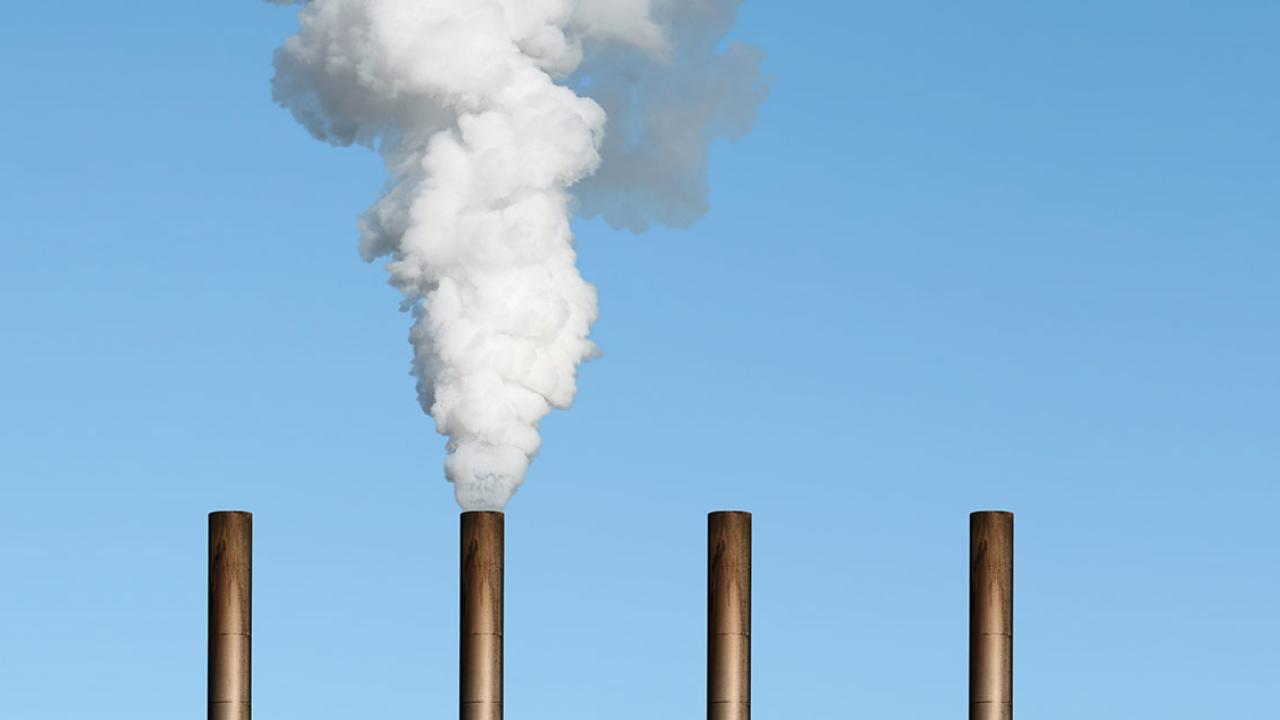
A new study by researchers from the Columbia Center for Children’s Environmental Health (CCCEH) at Columbia University Mailman School of Public Health reports that the Regional Greenhouse Gas Initiative (RGGI) has been successful in reducing fine particulate matter (PM2.5) emissions and substantially improving children’s health, both major co-benefits of this climate policy. Among the benefits between 2009-2014 were an estimated 537 avoided cases of childhood asthma, 112 preterm births, 98 cases of autism spectrum disorder (ASD), and 56 cases of term low birthweight. The associated economic savings were estimated at $191 to $350 million over the years. These findings are published today in Environmental Health Perspectives.
Initiated in 2009, RGGI is the country’s first regional cap- and- trade program designed to limit carbon dioxide (CO2) emissions from the power sector. Under the agreement, nine participating northeastern states—including New York— were required to limit emissions from fossil fuel power plants with a capacity of 25 megawatts or greater. Regulated power plants must obtain annual CO2 allowances which are auctioned quarterly and may be traded between plants or offset. Although RGGI is focused on reducing GHG emissions, it has also lowered emissions of other pollutants, including PM2.5., nitrogen oxides (NOx) and sulfur dioxide (SO2).
The researchers estimated the health benefits to children and associated economic savings using the Environmental Benefits Mapping and Analysis Program (BenMAP) tool, a computer program supported by the U.S. Environmental Protection Agency. For the first time, the researchers incorporated additional health outcomes, not previously included in BenMAP, that are associated with prenatal and childhood exposure to PM2.5.
“As impressive as they are, these estimated benefits for children do not take into account their potential life-long consequences, so they are likely underestimates of the true benefits of this policy,” says lead author Frederica Perera, PhD, DrPH, professor of environmental health sciences at Columbia Mailman School and director of translational research at CCCEH. “These results should spur more such initiatives to address climate change and improve the health of our children.”
Additional authors include David Cooley at Abt Associates, Alique Berberian at the Columbia Center for Children’s Environmental Health, David Mills at Peak to Peak Economics, and Patrick Kinney at Boston University’s School of Public Health.
This research was supported by the Environmental Protection Agency (RD83615401) and National Institute of Environmental Health Sciences (P50ES09600), the John Merck Fund, the John and Wendy Neu Family Foundation, and an anonymous donor.
joy organics cbd gummies are a within easy reach and enjoyable street to extract cannabidiol without the high. Varied people use them to ease force, benefit zizz, or promote complete wellness. The effects usually upon within 30–60 minutes and can pattern for a few hours. You’ll find options with melatonin, vitamins, vegan ingredients, or no added sugar. They come in a wander of flavors and strengths. It’s in the most suitable way to start with a little dose and on all occasions contain representing third-party lab testing to secure trait and safety.
Unser Team arbeitet kontinuierlich daran, das Spielerlebnis in unserem Casino zu
verbessern und neue, aufregende Funktionen und Spiele anzubieten. Registrieren Sie sich noch heute und profitieren Sie von unserem großzügigen Willkommensbonus.
Ein weiterer aufregender Trend ist die Einführung von virtuellen und augmented Reality-Spielen, die ein noch
immersiveres Spielerlebnis bieten. Diese mobile Version bietet die gleiche
beeindruckende Auswahl an Spielen wie die Desktop-Version,
sodass Sie keine Kompromisse bei der Spielqualität eingehen müssen. Die meisten Online
Casinos bieten eine mobile Version ihrer Plattform an, die speziell für Smartphones und Tablets
optimiert ist.
Und dann gibt es auch noch ein Stammkunden-Programm, über
das Dauerspieler mit persönlichen Angeboten versorgt werden. Aktuell bietet das Casino Rocket
Casino neben dem Willkommensbonus noch eine ganze Reihe Reload
Angebote an. Und wenn mit den Freispielen gewonnen wird, müssen die Gewinne ebenfalls 40-fach umgesetzt werden. Wer etwas mit Kryptospielen und Kryptowährungen anfangen kann,
wird hier vollumfänglich zufriedengestellt. Darüber hinaus können Sie bei Casino Rocket die App
herunterladen und installieren, um sofortigen Zugriff auf Glücksspiele zu erhalten. Um
den Willkommensbonus von Casino Rocket zu erhalten, müssen Sie eine Einzahlung von 20 € oder mehr tätigen.
References:
https://online-spielhallen.de/spin4bonus-top-casinoseiten-fur-deutschland-2025/
Then, facing a third-and-13, Goff checked down for a short gain, and Jack Fox blasted a 70-yard
punt that went out of bounds at the 1-yard line.
A holding penalty, fumble-turned-sack, and checkdown led to
a punt, giving the Lions offense another opportunity
to figure things out. But Minnesota’s offense
proved to be just as pathetic. On the very first play,
Goff’s pass for St. Brown was jumped by Vikings safety
Harrison Smith for the Vikings’ second interception on consecutive passes.
Detroit’s miserable day on offense continues. The Vikings retook the lead by playing some bully-ball and establishing some push on the line
of scrimmage.
In their devastating Week 16 loss to the Pittsburgh Steelers,
with their season on the line, the Lions started former undrafted rookie Kingsley Eguakun at center with Glasgow out.
The offense has been better with Campbell calling plays than it
was with Morton calling plays, but still not up to the level it was when Johnson was
running plays. Before they can put the pieces back together,
the 2025 Lions will finish their season at Chicago next weekend (date and time to be determined) for
a season-ending battle with Ben Johnson’s first-place Bears.
Detroit’s eight second-half drives lasted an average of 4.3 plays,
in part because of the turnovers, but also because Detroit couldn’t move the ball even when it wasn’t being taken away.
It sucks,” said offensive tackle Dan Skipper, who started in place of Decker. Wide receiver Jordan Addison took an end-around on second-and-10 and raced up the sideline for a 65-yard touchdown that effectively finished the Lions’ season.
References:
https://blackcoin.co/steps-casinos-should-take-to-improve-their-cyberspace-security/
https://askoff.ru
evault reviews https://otvetnow.ru cheap movers dallas tx
https://askoff.ru
https://asklong.ru
https://iagperjusu.wordpress.com
https://dwspqdxcgw.wordpress.com
https://zfcejfyxiv.wordpress.com
https://dgaiyziytk.wordpress.com
https://hrjcdfdcvj.wordpress.com
https://thfdcufqah.wordpress.com